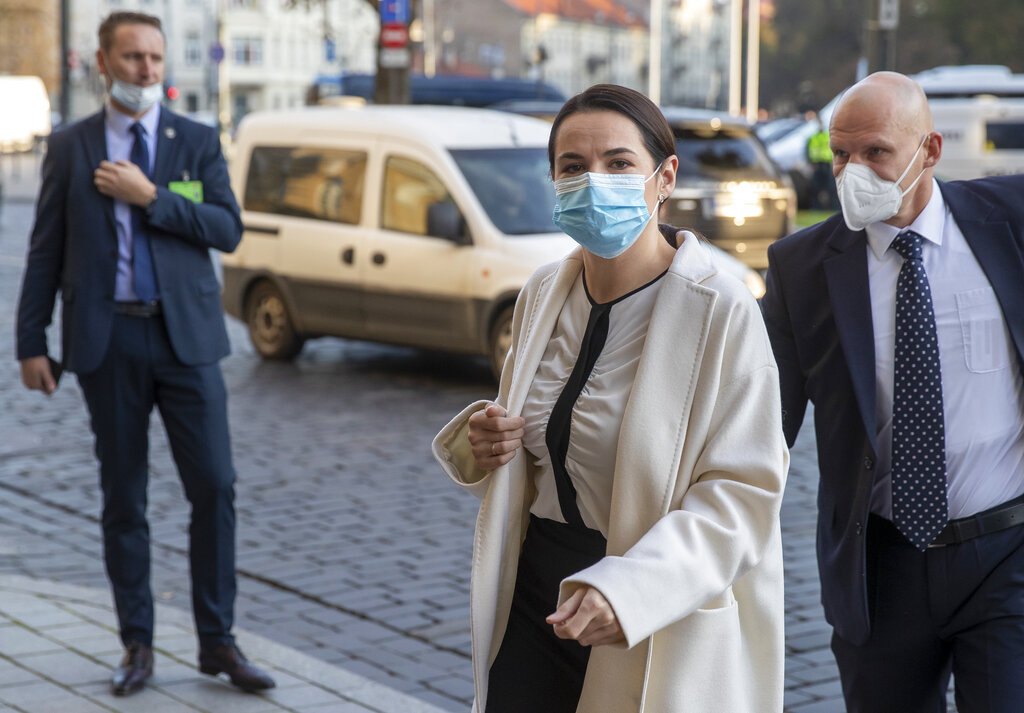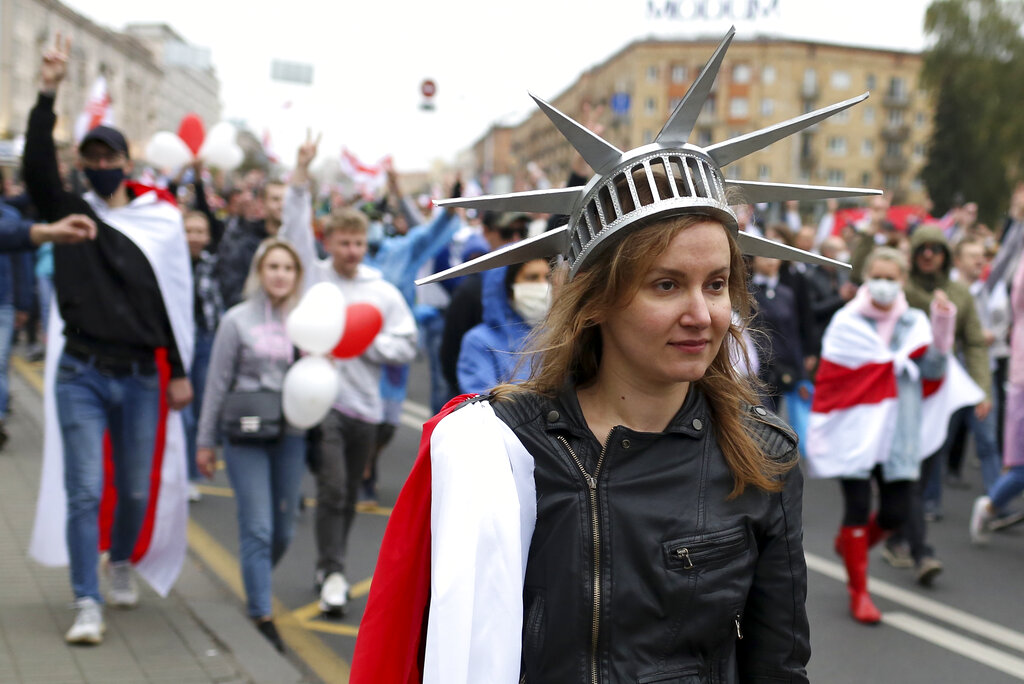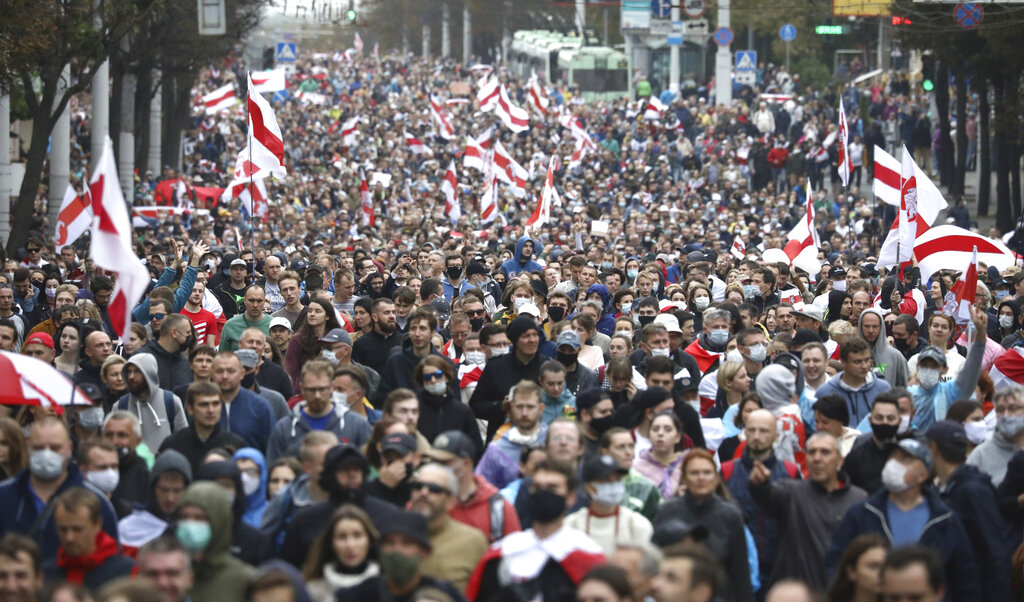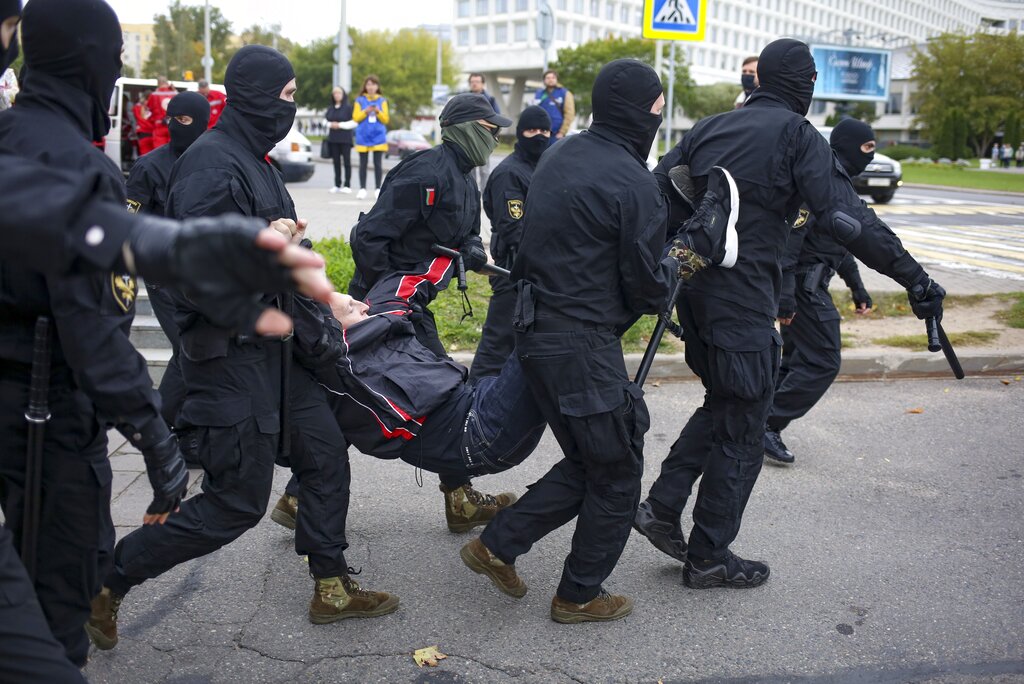VILNIUS, Lithuania — Rapes, beatings, and imprisonment are among the punishments for Belarusian democracy activists since fraudulent Aug. 9 elections.
And yet, hundreds of thousands gathered in the capital of Minsk for a seventh consecutive weekend, inspired by 38-year-old political novice Svetlana Tikhanovskaya’s unlikely run for president.
“All these victims will be in vain if we don’t win,” Tikhanovskaya told the Washington Examiner at her high-rise office in exile in Lithuania during a rare personal interview with an American journalist.
“For the first time for 26 years, we woke up. We can’t lose this chance,” the young opposition candidate said in carefully articulated English with a Slavic accent.
The housewife and mother of two said her supporters have motivated her to continue her fight for democracy from abroad. Tikhanovskaya was forced to flee Belarus after she was detained when filing a complaint about the election results.
Belarusians are hoping new elections will oust dictator Alexander Lukashenko, who is backed by Vladimir Putin and three battalions of Russian troops ostensibly in Belarus for joint military exercises.

Lukashenko reinaugurated himself in a secret ceremony last Wednesday, still claiming he won 80% of the vote.
Observers, however, say it is Tikhanovskaya who actually won the 80% and can legitimately claim to be president of Belarus.
‘Symbol of freedom’
At least a dozen European countries and the United States have refused to recognize Lukashenko’s inauguration, instead supporting calls for fresh elections and sanctions to pressure Lukashenko after human rights abuses.
Foreign leaders and top American diplomats, including Deputy Secretary of State Steve Biegun and George Kent, have met with Tikhanovskaya on multiple occasions.
The opposition leader acknowledges that she received the majority of votes, but she declines to say she is the legitimate president of Belarus. Rather, she positions herself as a figure who can help inspire democratic change.
“I call myself a symbol of freedom, a symbol of a democratic country, a national elected leader,” she said.
Nonetheless, her Vilnius office-in-exile has the markings of a diplomatic mission. A traditional flag of Belarus, white with a red stripe and horseman, flies at the front of the modern building in this Baltic capital, just 100 miles north of Minsk.
Inside, aides hand printed material face down to “our president” during meetings and shadow her while clutching cellphones and clipboards.
Meanwhile, volunteers give the office the feel of a tech startup, while eager, young Belarusians with red-and-white wrist bands buzz around.
Dotting small tables are cactus plants decorated with tiny white Belarusian flags, the same flag that waves fearlessly in the face of Mink riot police and is thrust in the air by Belarusians who shout anti-Lukashenko slogans from European capitals.

Though she took her husband’s place as a presidential candidate when he was jailed in May, Tikhanovskaya is not a practiced politician. She is new to the fight for democracy.
In an interview, she apologizes for not remembering words in English or for talking too much. But she is heartfelt as she explains her feelings and political strategy, articulating her thoughts with elaborate hand gestures.
Her sense of newfound security in Europe is visible. She is safe to speak her mind, but she feels the guilt.
“I was really afraid that Belarusian people would blame me that I went away,” she said, still pained by her decision to flee Minsk and join her children, already in Lithuania under guest visas.
“But the Belarusian people understood; the Belarusian people supported me and told me that it was the right decision,” she said.
Then, she explained her decision to continue her work for change from abroad: “I can’t betray political prisoners. I can’t betray all those people who were jailed and beaten and raped after the election.”
Her husband, businessman-turned-video-blogger Sergei Tikhanovskaya, mounted his own campaign for president until he was arrested by authorities.
Svetlana last spoke to him May 29, the night he was arrested. Now, she only communicates with him through a lawyer, and still fears for his safety.
Since arriving to Vilnius, her depression and sleepless nights have passed. The Lithuanian Ministry of Defense has arranged for additional guest visas to accommodate her team, which has grown to 40 volunteers and includes politicians, businesspeople, and athletes.
Lukashenko’s self-inauguration represented an opportunity for a new strategy for Tikhanovskaya and her team.
Renewing his presidential term meant moving from an internationally recognized tenure to a presidency based on elections that were widely considered fraudulent.
“The Belarusian people will never again agree to live with this person, with this killer who made these criminal orders to his riot police,” Tikhanovskaya said of Lukashenko.
Then, she directed her ire at the Belarusian president himself.
“Everything you are doing is humiliating us. You are beating us. You are torturing us. So, just for the first time in your presidency, talk to us,” she implored.
Left behind in Minsk and increasingly pressured is a coordination council, a team of individuals from across society that would serve as an intermediary between the opposition and the government.
So far, Lukashenko has only jailed and intimidated its members. A Sept. 14 meeting with Putin appeared to give Lukashenko permission to hold on to power, for now.

Caught between Russia and the West
When Minsk street protests were met with violence, Lithuania, which threw off the shackles of Soviet communism in 1991, was among the first countries to call for EU sanctions against Belarus. At the Baltic level, the country worked to build a broader European coalition and yanked travel rights from government elites.
Lithuanian Foreign Minister Lina Linkevicius now calls for accountability, trials for those responsible, and new elections. None of which he views as an affront to Russia in the face of Belarus’s human rights violations.
“We are surprised that this outgoing leadership is still supported by Russia,” Linkevicius told the Washington Examiner, speaking of Lukashenko’s regime.
“He has no mandate to represent people after what he did, morally or politically,” he said. “Our people are not neutral when something is happening. And this is also because of our history and because we know the price of freedom.”
Tikhanovskaya said the call for democracy in Belarus is not a choice between Russia and the West.
“That is not about geopolitics,” she said. “It’s our demonstrations against one person.”
That is the same message Tikhanovskaya asked America’s No. 2 diplomat, Biegun, to relay to Moscow.
“The USA is the oldest democracy in the world, and you can’t even imagine what it is to not have rights,” Tikhanovskaya said, describing her countryfolks’ lack of basic freedoms, such as expression and assembly, and a custom to “obey” authorities.
“Yes, it’s the 21st century, and we exist,” she said of Belarus. “There is such a country in the middle of Europe.”

Tikhanovskaya praised the U.S. Congress’s 2004 Belarus Democracy Act, which promotes democracy and free media efforts, and she called for more American sanctions on Belarus.
She also noted the growing list of sanctioned individuals from the regime and commended America’s quickness to widen that list.
Still, even though she praises American support, she is careful to explain that Belarus’s ties with Russia are stronger.
“Russia plays an important role in our economics. We are friendly countries. We are neighboring countries. We have a deep trade relationship,” she said. “But it’s not about our relationship. It’s about a fear inside of our country.”
Tikhanovskaya, who has tried to avoid commenting on Russia’s annexation of Crimea, believes a free and independent Belarus would not be a threat to Russia.
“We don’t want to [turn our] back to Russia. Absolutely not,” she said. “We adore Russians, and the Russians adore Belarusians.”
Putin, meanwhile, is at a crossroads, Vilnius University professor and Belarus expert Vytis Jurkonis explained to the Washington Examiner.
On the one hand, Putin cannot allow a despot to be overthrown in his sphere of influence, lest Russians be inspired to do the same. On the other, the Russian people have no taste for another foreign entanglement following the 2014 invasion of Ukraine, or current forays in Syria and Libya.
Tikhanovskaya, while new to politics, has widespread support as a potential future leader, say observers.
“She’s as legitimate a person as you can get at the moment in Belarus. And that’s what needs to be understood,” Jurkonis said of the accidental leader. “Even if she was thrown into the water, she proved that she is a pretty damn good swimmer.”
After a 45-minute interview, Tikhanovskaya stood in black sneakers with thick, white soles and moved toward an open area in her brightly lit office. Her tan knit sweater and pants flowed as she walked, and volunteers gravitated toward her for a meeting.
“One day, he will have to start this dialogue because we are continuing our pressure on him,” Tikhanovskaya said of Lukashenko before the interview concluded, citing peaceful protests, dwindling international recognition, and mounting sanctions. “In the end, it will work. I’m sure of this.”
Tikhanovskaya declines to speculate if more bloodshed is needed to oust Lukashenko, or what Putin’s next move might be. She just knows that there is no turning back.
“A revolution in [the] consciousness of the Belarusian people happened this year,” she said. “In a future democratic country, we invite you.”
Video courtesy Maximilien Dejoie/ Virginija Vareikyte, Roast Beef production.

